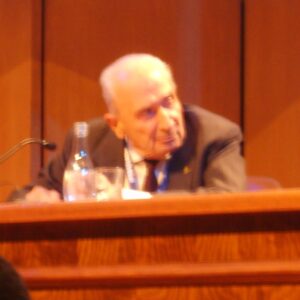Giovanni Sartori was born on May 13th, 1924, in Florence, central Italy. During his childhood, he experienced the rise of Fascism and Benito Mussolini in his homeland. Besides, Nazism and Communism were also soaring in this period all around Europe. Along with World War II., these factors played a significant role in his future career. He, on the contrary, had a passion for liberal democracy.
He graduated from the University of Florence in 1946. Sartori specialized in social and political sciences. At that time, the university did not offer a course only in political science. Further, he stayed at the university to lecture the doctrine of the state and the history of modern philosophy.
In 1963, he became a professor of sociology. More importantly, he became a professor of political science three years later. He was the first modern Italian to hold this title. So, experts regard him as the father of political science in Italy.

✟ April 4, 2017, Rome, Italy
Giovanni Sartori and his work
For a major part of his career, Sartori stayed in the USA. And that was despite his critical view on political science in the country. First, he taught at the universities Harvard, Yale, or Stamford. Besides that, he spent 25 years at Columbia University in New York.
Thanks to Sartori’s background, his work revolved around the theory of democracy. To elaborate, it was the concepts of party systems and electoral systems. Presumably, his most famous piece of work is the 1976 book Parties and Party Systems.
Further, in the book, he discusses the forms of party systems. Among these are single-party, bipartisan, predominant, pluralism, and others. He believed the method should only take relevant parties into account. Hence, this is called Sartori’s typology, and it is the most common approach for classifying party systems.
In conclusion, winning many awards, he is one of the most impactful political scientists of the 20th century. He died battling throat cancer on April 4th, 2017, in Rome. He was 92 years old.
“What democracy is cannot be separated from what democracy should be.”
Giovanni Sartori
